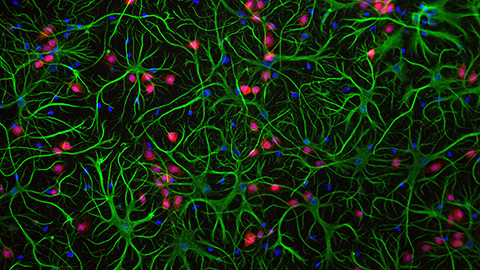New form of omega-3 could prevent visual decline with Alzheimer’s disease
For the first time, researchers have developed a form of the omega-3 fatty acid docosahexaenoic acid (DHA) that is capable of crossing into the eye’s retina to ward off visual declines related to Alzheimer’s disease, diabetes and other disorders.
The DHA found in fish oil capsules and other supplements is typically in a form called triacylglycerol (TAG) DHA. Although TAG-DHA has benefits in other parts of the body, it does not reach the eyes because it cannot travel from the bloodstream into the retina. For the study, researchers created a new lysophospholipid form of DHA, or LPC-DHA. In studies using mice, LPC-DHA successfully increased DHA in the retina and reduced eye problems associated with Alzheimer’s-like processes.

“Dietary LPC-DHA is enormously superior to TAG-DHA in enriching retinal DHA and could be potentially beneficial for various retinopathies in patients,” said Sugasini Dhavamani, a research assistant professor in the Department of Medicine at the University of Illinois at Chicago. “This approach provides a novel therapeutic approach for the prevention or mitigation of retinal dysfunction associated with Alzheimer’s disease and diabetes.”
Dhavamani will present the research at Discover BMB, the annual meeting of the American Society for Biochemistry and Molecular Biology, March 25–28 in Seattle.
In healthy eyes, DHA is concentrated in the retina, where it helps maintain photoreceptors, the cells that convert light into signals that are sent to the brain. DHA deficiency in the retina is associated with vision loss. People with Alzheimer’s disease, as well as those with diabetes, retinitis pigmentosa, age-related macular degeneration and peroxisomal disorders, frequently have abnormally low levels of retinal DHA, and visual impairments are common as a result.
While boosting DHA can help to prevent such declines, increasing retinal DHA content has been challenging with currently available supplements. For a dietary supplement to deliver DHA to the retina, the DHA must be able to first be absorbed from the intestine into the bloodstream and then cross from the bloodstream into the retina.
“Increasing the retinal DHA at clinically feasible doses has not been possible until now because of the specificity of the blood–retinal barrier that is incompatible with the specificity of the intestinal barrier,” said Dhavamani. “This study uses the novel approach of dietary LPC-DHA that overcomes both intestinal and blood–retinal barriers and improves retinal function.”
The researchers tested their LPC-DHA supplement in mice bred to exhibit processes similar to those found in early-onset Alzheimer’s disease. After six months, mice that were fed LPC-DHA daily showed a 96% improvement in retinal DHA content as well as preserved retinal structure and function. In contrast, TAG-DHA supplements had no effect on retinal DHA levels or function.
The results suggest that LPC-DHA supplements could help to prevent Alzheimer’s-related declines in visual function. Researchers say the approach should also be helpful for other disorders in which DHA deficiency and vision impairment are common.
The dosage of LPC-DHA used in the study is equivalent to about 250 to 500 milligrams of omega-3 fatty acids per day in humans. Since these studies were conducted in mice, further studies would be needed to confirm that LPC-DHA is safe and effective for use in humans.
Sugasini Dhavamani will present this research during the spotlight session on chemical biology of natural products, nucleic acids and small molecules from 3:15–4:15 p.m. PDT on Monday, March 27, in Rooms 602–604 of the Seattle Convention Center (abstract). Contact the media team for more information or to obtain a free press pass to attend the meeting.
Enjoy reading ASBMB Today?
Become a member to receive the print edition four times a year and the digital edition monthly.
Learn moreGet the latest from ASBMB Today
Enter your email address, and we’ll send you a weekly email with recent articles, interviews and more.
Latest in Science
Science highlights or most popular articles

Building a career in nutrition across continents
Driven by past women in science, Kazi Sarjana Safain left Bangladesh and pursued a scientific career in the U.S.

Avoiding common figure errors in manuscript submissions
The three figure issues most often flagged during JBC’s data integrity review are background signal errors, image reuse and undeclared splicing errors. Learn how to avoid these and prevent mistakes that could impede publication.

Ragweed compound thwarts aggressive bladder and breast cancers
Scientists from the University of Michigan reveal the mechanism of action of ambrosin, a compound from ragweed, selectively attacks advanced bladder and breast cancer cells in cell-based models, highlighting its potential to treat advanced tumors.

Lipid-lowering therapies could help treat IBD
Genetic evidence shows that drugs that reduce cholesterol or triglyceride levels can either raise or lower inflammatory bowel disease risk by altering gut microbes and immune signaling.

Key regulator of cholesterol protects against Alzheimer’s disease
A new study identifies oxysterol-binding protein-related protein 6 as a central controller of brain cholesterol balance, with protective effects against Alzheimer’s-related neurodegeneration.

From humble beginnings to unlocking lysosomal secrets
Monther Abu–Remaileh will receive the ASBMB’s 2026 Walter A. Shaw Young Investigator Award in Lipid Research at the ASBMB Annual Meeting, March 7-10 in Washington, D.C.

